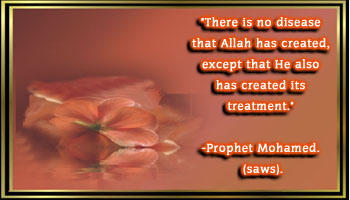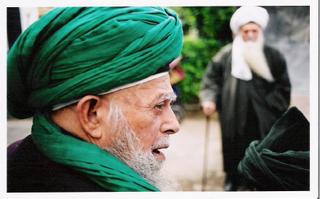The Truth
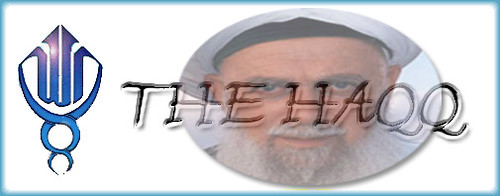
Saturday, July 30, 2005
Friday, July 29, 2005
Love is a Stranger
Bismillahi 'r-rahmani 'r-raheem
What shall I do, O Muslims?
I do not recognize myself.
I am neither Christian nor Jew,
nor Magian, nor Muslim.
I am not of the East, nor the West,
not of the land, nor the sea.
I am not from nature's mine,
nor from the circling stars.
I am neither of earth nor water,
neither of wind nor fire.
I am not of the empyrean,
nor of the dust on this carpet.
I am not of the deep, nor from behind.
I am not of India or China,
not of Bulgaria, nor Saqsin;
I am not of the kingdom of Iraqain,
nor of the land of Khorasan.
I am not of this world nor the next,
not of heaven, nor of purgatory.
My place is the placeless,
my trace is the traceless.
It is not the body nor is it the soul,
for I belong to the soul of my love.
I have put duality away
and seen the two worlds as one.
One I seek, One I know.
One I see, One I call.
He is the First, He is the Last.
He is the outward, He is the Inward.
I know of nothing but Hu, none but him.
Intoxicated with the cup of love,
two worlds slip from my hands.
I am occupied with nothing
but fun and carousing.
If once in my life I pass a moment without You,
I repent my life from that moment on.
If once in this world
I should win a moment with You,
I will put both worlds under my feet
and dance forever in joy.
O Shams of Tabriz, I am so drunk in the world
that except for revelry and intoxication
I have no tale to tell.
by Mevlana Rumi
Read more!
Thursday, July 28, 2005
Selected Ones
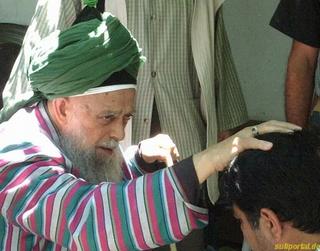
"What God sends, these are selected people.
We don't want the unselected.
There are many people outside. You can go to them.
I am leaving them for others.
I want the selected ones.
When the selected ones come, you can depend on them.
The unselected ones come and go, come and go, like a sieve.
What remains are the selected ones."
- Mawlana Shaykh Nazim al-Haqqani
Read more!
Tuesday, July 26, 2005
Fighting Depression with Dhikr
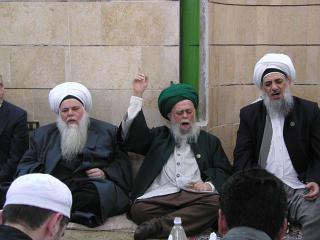
May Allah keep us from the evil of our egos. As much as you are able, fight your ego. There is a different test each day; Allah Almighty is looking. If you go after your ego like a sheep, then it is dangerous. Keep to the right hand and go on, straight. Then there will be peace and satisfaction for you, here and in the Hereafer.
May Allah Almighty let all of you taste real faith. It is sweet, real faith's taste. When you taste real faith, you keep it, never losing it. The one who does not taste, he quickly leaves, quickly loses.
Which way makes you taste real faith? Dhikr; dhikr makes you taste the taste of iman. Say Allah…and you may taste the taste of faith. Whoever feels darkness and depression in his heart may say Allah, Allah, Allah…, and then nothing can stop his heart. When you say Allah, Allah, Allah…, there is no darkness in your heart. But if it should continue, keep your tongue silent and make your heart say Allah hu, Allah hu, Allah hu, haqq,* and you should hear the same dhikr, which we are now saying, in your heart.
Now listen! Three times Allah hu, haqq. Any time you may want to listen and keep your tongue silent, look at your heart, and you may, you must, hear that dhikr going on, never stopping. When you are listening, then darkness and depression are going away.
"Allah, Allah, Allah, truth (or reality)." This dhikr was transmitted by the Holy Prophet (s) to Abu Bakr as-Siddiq when the two of them hid in the cave of Thaur near Mecca during their flight from Mecca to Madinah.
Wa min Allah at Taufiq
- Sheikh Nazim Adil Al Haqqani
Read more!
Saturday, July 23, 2005
Wednesday, July 20, 2005
Hajja Amina Adil

Bismillahi' r-Rahmani 'r-Raheem Inna lillahi wa inna ilayhi raji`oon.
To Allah we belong and unto Him do we return
Hajjah Amina Adil is a renowned author, lecturer and spiritual advisor who, for more than forty years, has devoted herself to help people of all walks of life better understand Islam. In addition, she has played a pivotal role in helping Muslim women understand and apply the many distinguishing rights God Almighty set forth for women in the Islamic faith.
Married for fifty years to Shaykh Muhammad Nazim Adil al-Haqqani, the spiritual head of the Naqshbandi-Haqqani Sufi Order, Hajjah Amina has traveled the world. A scholar of Shari`ah and shaykha, she has thousands of disciples throughout North and South America, Europe, the Middle and Far East, Southeast and Central Asia, and Africa. She studied under many scholars of the Middle East and Turkey, including Grandshaykh Abdullah ad-Daghestani an-Naqshbandi, among others. Hajjah Amina is from the family of Prophet Muhammad (s).
She was born in Russia's Kazan Province during the early Communist era, which mandated a statewide purge of Jews, Christians and Muslims. With neighbors mysteriously disappearing and millions exiled to camps in Siberia where they either froze or starved to death, when she was a mere toddler the family fled on foot in the dark of night on a perilous journey that, for reasons of safety, could only be undertaken with the clothes on their backs.
Too young to recall the long journey that would eventually lead them to Turkey, family members have narrated her parents' bravery and deep sense of faith, young Amina's sense of adventure, and a tragic life-threatening fall that left her in a coma from which they feared she would not recover.
After more than a year and with Communist officials in deadly pursuit, the family miraculously made their way to Arzurum in northeastern Turkey. Thus, at such a tender age, Hajjah Amina was granted the high status of "muhajirah", which means one who migrated from tyranny and religious oppression to a place where they can openly practice their faith. It is said the reward for such an undertaking rests solely with God Almighty.
These early life experiences seem to have shaped Hajjah Amina's love of family, community and travel, her forthrightness in standing for justice, and her love of Islam. However, after twelve years in Turkey, Hajjah Amina's father had a vision in which he was instructed to relocate the family to "Sham" (Damascus), which had been their original destination upon leaving Russia.
In Damascus they found the life they had been seeking, and settled on Jabal Qasiyun, a high mountain which overlooks the entire city. It was here the family met Grandshaykh Abdullah al-Fa`iz ad-Daghestani of the Golden Chain of the Naqshbandi Sufi Order, who took particular care in overseeing Hajjah Amina's religious and spiritual development. Under Grandshaykh Abdullah she studied Tasawwuf (Sufism – Islamic spirituality) and she studied Fiqh (Islamic Jurisprudence) under such notable scholars as Shaykh Salih Farfour of Syria and Shaykh Mukhtar Alaily, then Secretary General of Religious Affairs of Lebanon.
Hajjah Amina's teachers and mentors were always amazed with her acumen, with her high level of retention, and her ability to grasp and reason complex issues within the framework of Islamic Law, even at a young age.
At age twenty-three, upon the advice of Grandshaykh Abdullah she was engaged to the young Shaykh Nazim; they married a month later and have remained great companions for nearly fifty years. In fact Shaykh Nazim often remarks that his wife seems to him the same as when they first married. Together they have lived and raised their four children between Syria, Turkey and Cyprus, and at the time of this writing they have been blessed with sixteen grandchildren and six great-grandchildren.
As a young mother and wife of a shaykh in training, Hajjah Amina was often left alone to face the challenges of raising a family while her husband was either in spiritual retreat or traveling for months on end, visiting various regions to spread the word of the Unity of God. This, coupled with her early life experience, only strengthened her faith and reliance on God Almighty. Hajjah Amina has thrice performed Hajj, the Islamic pilgrimage to Mecca.
Known for her wise, practical approach to life and her problem-solving skills, over the years she has become a much-turned-to advisor of women on a host of issues. She speaks fluent Turkish and Arabic, and is proficient in English. She is uniquely beloved to heads of state and their ministers, to celebrities, as well as common folk.
Hajjah Amina's other works include the three-volume series Lore of Light, her inimitable narration of stories of the prophets and miracles of the saints.

Read more!
Monday, July 18, 2005
Shadows

People are running away from a shadow – a shadow which is themselves, that is why they are ill – and the harder they run, the more their miseries catch up with them. They flee from themselves all their lives in pursuit of a desert mirage that turns out to be nothing but sand. After all that struggle to reach that “Oasis” and to quench their thirst, they find that their struggles and false hopes have only made them more parched and that much closer to death for their efforts.
When they arrive they drink the draught of death and must face a meeting with their Lord for which they are unprepared. This is the fate of those who waste away their lives in vain amusement.
The main goal of Islam and of Sufi Paths, especially the Naqshbandi Path, is to bring people back to themselves, to teach them to stop fleeing from their own shadows and to stop chasing a mirage.
Mercy Oceans- Devine Sources (Shaykh Nazim al- Qubrusi)
Read more!
Silsila of Naqshbandi-Haqqani

The Golden Chain of the Spiritual Transmission
of the Naqshabandi Khwajagan Masters
1. The Holy Prophet Muhammad Mustafa (Peace be upon him)
2. Abu Bakr as-Siddiq (ral)
3. Salman al Farsi (ral)
4. Al-Imam Qasim bin Muhammad bin Abu Bakr as-Siddiq (ral)
5. Al-Imam Ja'far as-Sadiq (ral)
6 Abu Yazid al Bistami (ral)
7. Abul Hasan al Kharqani (ral)
8. Abu Ali al Farmadi (ral)
9. Yusuf al Hamdani (ral)
10. Abul Abbas (Khidr, upon whom be peace)
11. Abdul Khaliq al-Ghujadawani (ral)
12. Arif Righwari (ral)
13. Mahmud al Faghnawi (ral)
14. Ali Ramitani (ral)
15. Muhammad Baba Sammasi (ral)
16. Seyyid Amir Kullal (ral)
17. Qutub at Tariqah Shah Bahauddin Naqshband al Uwaysi al Bukhari (ral)
18. Alauddin Muhammad al Attar (ral)
19. Ya'qub al Charkhy (ral)
20. Ubeydullah al Ahrar as-Samarqandi (ral)
21. Muhammad az Zahid (ral)
22. Dervish Muhammad al Bukhari (ral)
23. Hajegi Emkeneki as Samarqandi (ral)
24. Muhammad al Baqibillah as Samarqandi (ral)
25. Mujaddid al Alf ath Thani Imam Rabbani Ahmad Faruq as Sirhindi (ral)
26. Urwat ul Wuthqa Muhammad Ma'sum ar Rabbani (ral)
27. Haji Sayfuddin ar Rabbani (ral)
28. Nur Muhammad al Badwani (ral)
29. Habibullah Mizra Jan i Janan al Mazhar (ral)
30. Ghulam Ali Abdullah ad Dehlawi (ral)
31. Ziyauddin Abu Naasan Muhammad Khalid al Baghidadi ash Shami (ral)
32. Sheikh Ismail an Narani (ral)
33. Khas Muhammad Shirwani (ral)
34. Sheikh Muhammad Yaraghi (ral)
35. Sayyid Jamaluddin al Ghumuqi al-Husseini (ral)
36. Abu Ahmed as Sughuri (ral)
37. Abu Muhammad al Madani (ral)
38. Sayyid Sharafuddin ad Daghistani (ral)
39. Sheik Abdullah Faiz ad Daghistani (ral)
40. Sheikh Muhammad Nazim Adil al Haqqani al Qubrusi (qsa)
Read more!
Sunday, July 17, 2005
Whirling Dervishes
Bismillahi 'r-rahmani 'r-raheem
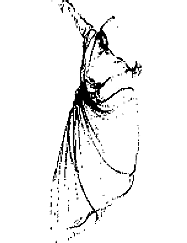
Dervishhood
By Kabir Helminski
A dervish is an apprentice, one who is learning the profession that will provide eternal livelihood. This profession is still taught in certain "schools of higher learning." While there are many skills that can be self-taught or learned alone, the skills of dervishood are learned by being in relationship to a shaikh, or guide, and within a spiritual family, a Sufi circle.
There will always be much to learn on one's own, through one's own efforts, and within one's own understanding. The final responsibility, of course, lies with ourselves, and in reality there is no intermediary between us and our God. And yet one can no more become a dervish alone than one can become a lover alone.
People will dedicate the whole of their lives to becoming a accomplished musician or a professional athlete. In doing so they will have to organize the whole of their lives around this one master desire. A dervish is one who has made Truth his or her master desire and is willing to submit all other desires and aims before this aim.
It is possible to make Sufism a pastime, one interest among others, but that does not make one a dervish. It is fine to read widely and become acquainted with various traditions, but to be a Sufi is much more than to have a preference for reading Sufi books or listening to Sufi music.The price of dervishood is one's whole life, a total commitment of one's life energies. Fortunately, in our tradition it does not mean the abandonment of a productive and socially useful livelihood, nor the renunciation of marriage and family, but it does mean that everything we are involved with will be understood and arranged from the perspective of our essential spiritual intention. Certain lifestyles may not be consistent with our intention; certain forms of livelihood may not be appropriate in light of the more stringent requirements of remembering God with each breath. We may find that we are not asked to sacrifice everything, that the Way does not contradict our essential humanity.
We may find that our Friend is a patient, generous and compassionate Friend, but we gradually learn that we ourselves must withhold nothing.In dervishood we pledge ourselves to a shaikh and a lineage. This reaches hand over hand all the way to Allah. Our pledge, our obedience, our commitment is to Allah, and the shaikh is a link. Why should there be any intermediary at all? This is a very good question. Actually there is no intermediary if the shaikh is a real shaikh and if one's pledge is sincere.
The shaikh actually is the evidence of God's mercy and generosity, making grace more tangible, more immediate. The shaikh does not gather power or privilege for himself or herself, but is the servant of the yearning of the dervish's heart. The shaikh may also be the challenger of the dervish's egoism, calling us to surpass our timidity, our fears, our comfortable complacency. The shaikh may be the one to say, "Come into this fire, it will not burn you."No shaikh is perfect, and it is particularly in his function as shaikh that he may sometimes disappear and become a pure medium for divine grace or wisdom.
It is the dervish who helps to create the shaikh, and both are in the process of learning from the relationship. It must be remembered that before becoming a shaikh one had to be a dervish, and one never stops being a dervish. One day Mevlâna and Shams were sitting together in spiritual intimacy and conversation. A messenger entered with the news that a certain shaikh in a distant village had died. The community was asking that a shaikh be sent to succeed their late teacher. Mevlâna said, "Send so-and-so--let him be your new shaikh." After the messenger had left, however, Shams turned to Mevlâna and said, "We're lucky they only asked for a shaikh. If they had asked for a dervish, one of us would have to go!"Spiritual seekers are typically people who have learned to question conventional reality.
Most spiritual seekers have experienced a loss of "blind faith" and have searched for answers to legitimate questions. Our post-modern culture has also suffered a loss of faith, the result of which can be characterized as a pervasive cynicism. The conventional conditioning and orthodoxy of the post-modern world consists of a profound cynicism, doubt, and inability to approach truth innocently. While one should look quite critically at any spiritual path or teacher before committing oneself, one shouldn't allow the pervasive cynicism and rebelliousness of our times to prevent one from seeing what humility and trust can offer.
Once one has decided to play the master game of self-transformation one must do it wholeheartedly.In my own case it took quite a while for me to understand the value of cultivating a relationship with a teacher. Although I didn't realize it at the time, I was a typical product of my own culture, a culture which has a fundamental mistrust and disrespect for leadership and authority. Perhaps I was simply too rebellious and critical. Now I can look back on my own relationships with my teachers with some remorse for the disappointments and pain I caused them through my insensitivity and lack of awareness.
It is easy to forget that the shaikh is a servant more than a master. The shaikh holds the keys to a treasure the seeker cannot really understand. He may be able to unlock the treasure within the dervish's heart, but how likely is he to do this for a someone who is half-hearted, ungrateful, or full of resistance, who lacks humility or respect? The dervish's intention should always be to allow a sincere love for the shaikh to grow and deepen. Sometimes the outer respect is the best that can be offered, but we must realize that we can fool ourselves more easily than we can deceive others and especially our shaikh. What is required in this relationship is a connection of love, rabita, which allows all that one has to pass to the other.
When there is real love between a shaikh and a dervish, the dervish comes into resonance with the wisdom and light of the shaikh, and the shaikh carries some of the burden of the dervish. A shaikh needs to be strong enough to do this and this is possible only with the help of God and the lineage, especially the Pir, the Complete Human Being from whom the particular order derives its baraka, or grace. There is more than one kind of real shaikh, in addition to the self-appointed teachers who can do some good and much harm. There are shaikhs who serve a kind of managerial function in dervish circles.
They need to have a certain natural authority, experience, and knowledge; they must be trusted not to use the position to gain any kind of advantage for themselves. In their managerial capacity they are useful in the preparatory work of dervish training, provided they are backed up by a real source of baraka. Then there are those shaikhs who have the permission of the unseen world, who have true spiritual authority.
Such a shaikh not only has experience, wisdom, and knowledge, but also serves as a channel for the transformative energies of the tradition, both in group activities like the zhikr, and in relationship to individual dervishes. In order for this individual connection to work at its highest potential, the student needs to cultivate a spiritual connection with the shaikh. The shaikh is a "wireless transformer" connected to the powerhouse of the Pir.In the story-book version of shaikh and dervish, the dervish is involved in a period of closely supervised experiences under the watchful eyes of the shaikh. While it would be wonderful to have such a shaikh in one's life to listen to one's problems and answer one's questions, such a situation is rare.
A Sufi shaikh is likely to have a family and a profession and rarely has the time to give such personal attention to many people. Unless one somehow shares in his mission, works by his side, or has reached a high degree of surrender and can give all one's time to the service of the shaikh, one's relationship will more likely be through attending regular meetings and keeping the heart connection active at other times.Given the rarity of real shaikhs, especially in the Western world, one should be thankful if one has found a connection even at a distance to an effective Sufi lineage. In reality, the dervish's connection is beyond the tangible matrix of space and time, beyond even the conscious mind.
What needs to flow to the student will flow if the student knows how to cultivate that connection and has surrendered to it. In the physical world we are under many limitations of time and space. In some cases you may see your shaikh in the tangible world only rarely. In the world of the conscious mind, you may cultivate a positive bond and even converse inwardly with your teacher. At the subconscious level of the heart, however, the shaikh's benevolent energy will be working on you continuously.
As Yunus Emre says, "Ever since the glance of the mature one fell upon me, nothing has been a problem."There are many legitimate issues regarding authority and its abuse that have occurred as Westerners have uncritically accepted other traditions, especially traditions untied from their traditional ethical moorings. In some cases we have been led to believe that outrageous and abusive behavior from the teacher is part of the training. One cannot have an absolute rule, but generally the stronger tactics are reserved for the strong and devoted dervishes, and only after the greatest bond of love has been made certain.
Rumi's own teacher, Shams of Tabriz, was a stringent master, and once said, "My wrath causes a seventy-year-long unbeliever to become a believer, and a believer to become a saint!" We should bear in mind, however, that abusive conduct was never the method of Muhammad. On the contrary, he showed profound respect to people, always being the first to say hello, jumping up to greet the humblest people. If Muhammad set this example he was teaching a lesson for generations to come.Shaikhs may also challenge a person's conditioning or belief structure, may even appear to be doing something unethical or harmful, as in the case of Khidr and Moses in the Qur'an. No real shaikh, however, would keep a student in a state of prolonged moral ambivalence.
If the shaikh appears to do or require something that contradicts one's idea of the good, or moral norms, or the religious law, the reason for this should be made clear before too long, as it was in the case of Moses and Khidr.The relationship between a shaikh and a dervish is one of the most sacred bonds any human being could experience. To find a real shaikh, and to be accepted by one, is a great gift. Shaikhs are taught that if one of their dervishes were to be excluded from the gates of paradise, the shaikh, too, must remain outside. If a shaikh accepts you into his heart and you can accept the shaikh into yours, it is in order that hand and hand you both will go to God. Value that relationship as you would an infant put into your hands: in the beginning it may require great care and sacrifice, and even perhaps sleepless nights, but eventually, after tests, difficulties, and joys, that infant relationship may mature into a being of strength and great beauty, and the generations of the Way will continue.
Read more!
What Sheikh Nazim al haqqani said about Maulana Rumi:
I begin with His sublime name,
Maulana is the high minded person
who makes the hearts of the people fruitful
with Divine Love and sympathy.
I introduce him to you and show my respect.
Thus I begin my words.
He is The One who is,
Whose absence does not exist,
It is Him, I love and Him I praise.
It is His path that I have chosen,
It is to His path that I have turned my face,
Everybody has somebody whom he loves,
The One I love is the Eternal Beloved,
He is the One whom I love,
He is so radiant
And so worthy of respect,
Those who love Him,
Are the immortal lovers,
He is He,
He is also He,
They are also He,
This is a mystery,
If you possess Love,
you will understand this,
This is what the Maulanas understand,
For others it is forbidden.

Read more!
Friday, July 15, 2005
Three Animals
Our Grandsheikh described how a Derwish may be acceptable as a servant to Allah Almighty. “He must have one character from each of three animals,” he said.”
From the donkey, he must be able to carry burdens with patience and without objection. Unless he can do this he will be unsuccessful, because without patience one cannot carry the responsibilities of life.
From the dog, he must learn faithfulness to his master. If the master tells the dog to stay somewhere until he returns, that dog will stay, even until death. If the owner beats it and chases it away, the dog will still return, with its tail wagging, when its master calls.
Finally, when a man looks at a pig, he must know that his nafs is dirtier and filthier than a pig. The dirt of pigs is external, it comes from eating dirty things. But the nafs is dirty inside. Its dirt comes from fighting with its Lord. A perfect man must have such a character that he will accept whatever dirt is thrown on him, whether by words or by actions, knowing that his nafs is dirtier.
”These three characteristics give a man rest and satisfaction in his heart. Only in this way can he reach happiness in this life. These are the characteristics of Prophets and Saints...
- Mawlana Shaykh Nazim Haqqani
Read more!
Love is ...

What is love? Love means to give up everything for the sake of human beings. Do you want more details? You know the details inside yourself. Everyone knows when he loves someone for the sake of God, for the sake of the Prophet (s), for the sake of masters: that is when he or she gives everything. If a man loves a woman and she asks him to bring her the sky, he will try to find a rocket to take him to the sky and try to bring the sky to her. If she tells him to bring her a diamond, he will try to buy her the best diamond that money can buy. Is this not true? If you love your Lord, it means you have to love every one of His creations and try to help them as much as possible.
-Mawlana Shaykh Hisham Kabbani
Read more!
The Four Archangels in charge of the Earth
The Four Archangels in charge of the Earth
"Almost might the heavens above be rent asunder while the angels hymn the praise of their Lord and ask forgiveness for those on the earth. Lo! God is the Forgiver; the Merciful" (42:5). "And how many angels are in the heavens whose intercession avails not save after God gives leave to whom He chooses and accepts!" (53:26) "A written record, attested by those who are brought near unto thier Lord" (83:20-21)
There are four angels and their innumerable retinues in charge of this world.
The First is Gabriel and his armies. He is in charge of Soldier-angels and revelation. Gabriel insures victory and is responsible for the extinction of nations: human, animal, vegetal, or others, when God wills it.
The Second is Michael and his armies, in charge of rain and vegetation. He conveys sustenance to nurture mankind.
The Third is Azrail the angel of death his assisstants. They are incharge of seizing the souls of those who die.
The Fourth is Israfil and his assistants, in charge of The Hour of Judgement Day. When the earth passes away God will order these angels to bring forth their scrolls and they will bring them. The God will order them to open the Book of Life. They will then find that their scrolls are the same as it.
Taken from "ANGELS UNVEILED- A SUFI PERSPECTIVE.
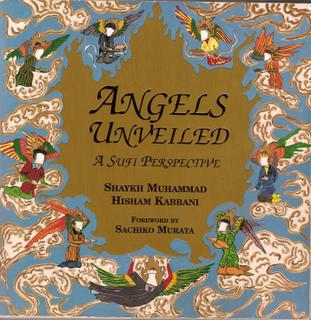
Read more!
Thursday, July 14, 2005
Love is The water of Life
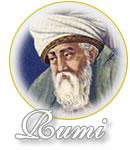 Bismillahi 'r-rahmani 'r-raheem
Bismillahi 'r-rahmani 'r-raheemLove is the Water of Life
Everything other than love for the most beautiful God
though it be sugar- eating.
What is agony of the spirit?
To advance toward death without seizing
hold of the Water of Life.
Read more!
Love
The garden of Love is green
without limit and yields
many fruits other than
sorrow and joy.
Love is beyond either
condition: without spring,
without autumn,
it is always fresh.
-- Jelaluddin Rumi
Read more!
Wednesday, July 13, 2005
The Power of Love

The Power of Love
a talk by Sheikh Nazim 1984/5
Bismillahi 'r-rahmani 'r-raheem
(Sheikh Nazim led the assembly in calling on the Holy Name of Allah - ya Wadud) – a Divine Name signifying God’s all embracing Love. (pronounced Wadood, rhyming with food). Then he spoke;
There is nothing in all creation that the Creator, Allah Almighty, hates. Indeed it is impossible to be hated by Allah and to be in existence; one absolutely precludes the other. All creation appeared through His Divine Love. He loved them and they appeared; therefore everything in existence carries its share of Divine Love in it.
When I say “everything”, I mean everything from atoms and their parts – the very building- blocks of the universe – up to mankind. Yes, everything, even the smallest particles of matter, carry that Divine gift. As you know, the electrons of atoms revolve around the nuclei, and at enormous velocity. Someone told me that the famous scientist Albert Einstein once declared; “I have come to understand so much, but what I have never been able to fathom is what power gives the electrons the energy to orbit nuclei at such a speed. From where does such power come to them?”
We believe, and furthermore, have been granted certainty in our belief, that everything in existence has life, is living. For the sake of everyday reckoning we classify certain things, such as rocks, as inanimate objects, and recognise life only in plants, animals and human beings. But we believe that beyond these outward distinctions everything has life. Therefore, atoms, and their electrons that turn around the nuclei with such speed as to baffle even the renowned Mr Einstein, are, in reality, alive. They are alive with the Divine Love Power that their Lord has granted them. That’s what makes them spin at the speed of light.
It is for those who have access to a realm of knowledge beyond science to say with certainty, that it is Allah Almighty, the Lord of the universe, who through His Holy Name “Al Wadud” ( the All-loving ) gives His Divine Love to everything in the universe. Those electrons, drunken with Divine Love, spin at such velocity around the nuclei. That is how the influence of Divine Love is manifested by them.
Science can neither prove nor deny this explanation, as this phenomenon is beyond their realm, and they cannot as much as offer a theory. But our hearts may be content with this explanation, as each and every one of us may try it himself within himself; for we all have the power of that Divine Love in our hearts ready to be contacted.
There is no one word in western languages that gives the full meaning of “Al Wadud”. And even explanations don’t do it justice, even though the west claims its knowledge to be superior and looks down disdainfully on every religious experience. And this Holy Name, the meaning of which cannot even be adequately expressed in advanced western languages, is the most suitable “Dhikr”, the most suitable of all the Divine Names to repeat and meditate upon for people who see themselves as superior beings and as being above normal standards.
“Love,” it is certainly not a concept that western culture is unfamiliar with, and undoubtedly most people lay claim to loving and being loved, to knowing the meaning of love, and to it being an important aspect of their lives, indeed the most important. But the love we refer to in connection with the Divine Name “al Wadud” is not the physical transitory love that is rapidly becoming the only meaning of love applicable to modern man; the love that one may find in the zoo. If you can’t imagine a love other that what is on the level of animals, then you belong in the zoo.
There is a real love, never changing, never dying love, and then there is temporary animal love. Both are in man through the wisdom of the Creator, but the permanent Love is the love given to man through the Divine Name “Al Wadud”. To realise that love is the challenge and fulfilment of human existence - to come in contact with those love oceans, for He has given His Divine Love to His most honoured representatives in creation, mankind.
You may love a young lady for her youth, and when that youth departs you love her no more. That is false love. Sometimes we may have both kinds of love simultaneously, but usually the physical overpowers the spiritual, so that it is never allowed to appear. But to reach the ultimate goal of human life we are in need of permanent love, and it is only the Lord of the universe who can grant it.
Therefore, when we say “Ya Wadud” we are opening ourselves up to that Divine Love, asking our Lord to awaken that Love that knows no limitation, that is eternal and extends to all creation.
I have been ordered to teach and advise people to call on our Lord, saying “Ya Wadud”, as this will enable the sincere to attain real love of their Lord Almighty and to love everything around themselves. We must learn to love everything for the sake of the Love the Creator has for all His creation.
And we are in utmost need to pray for such love, as, although it is the essence of all success in the way of spiritual purification, it has become almost extinct in our times. Therefore, suffering, disturbances, struggle, crises and chaos are continually on the rise.
What passes for human love nowadays is indeed a very far cry from real human love. Mostly people cling to it for two or three months then throw it away. You are saying; “Oh my goddess”, and she is saying “Oh my god”, but look in again on them two or three months later and see what is left of that “true devotion” and “deep emotion.” That is the greatest cause of wretchedness in our times.
For this reason I don’t refer to this century as a civilised one. Rather, the twentieth century is witnessing the destruction of civilisation, and every minute violence and misery are increasing. A society may be termed “civilised” when it provides the surrounding in which people may easily reach to the point of extending their permanent love to everyone. One shouldn’t be so proud of being a part of Twentieth Century Civilisation”, for I really don’t consider such a violent and sick society to be civilised, and when I come here (London) I feel my hair standing on end from what I see. Such wildness! No familiarity! Everyone looking so suspiciously to each other!
Because of this acute situation in our times we must, first and foremost, seek to awaken permanent love. Practices, prayers and rules are of no use in this time without love. For people whose hearts have not regained contact with such love, the ego easily attaches itself to practices and uses them as a means to pin empty titles onto itself. Leave every practice that serves your vanity and strive for permanent Love.
Where shall we start? Every person has a circle of friends, relations, acquaintances. Starting from those closest to us: wives and husbands, parents and children, brothers and sisters, we must be generous in giving of our permanent love. How can we consider a person who cannot make peace with those nearest to him as civilised? If we could approach the level of permanent love that befits us the world’s courts would have to be closed down from a lack of suits: no complaining, no divorce, no wretchedness, no struggle.
Giving of our permanent love is the most important practice for our time. No one can say ”I am not in need of practising it, “ neither the speaker nor the listeners. Don’t tell me that so-and–so is on such-and-such a level when he is tight-fisted with permanent love, withholding it even from those with whom he is most intimate.
The lower self of man, the selfish ego, never wants to give permanent love except to himself. I don’t believe that such petty self love is all we have been created for. I believe that we have been created to love all creation. Man represents his Lord on earth and has the greatest reservoir of Divine Love within him; he can be a great means of expression for that Divine Love in this world. Indeed a fountain of love that every creature may drink from.
Abridged from Mercy Oceans of the Heart (also partially reprinted in On the Bridge to Eternity)
Read more!
Monday, July 11, 2005
Introduction
assalamu'alaikom,
Just wanted a blog to share some articles and material that really inspire me. I hope you enjoy the read through this blog, insya'Allah.
Just a little bit about myself: I'm an Australian-born Lebanese, happly married and really enjoy reading and learning about the Naqshbandi Tariqah.
Hope that's enough for an introduction.
Aaisha
Read more!
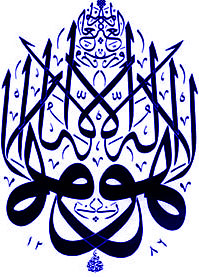
Previous Posts
- Mawlana meets Pope Benedict in Cyprus
- The Sufi
- To be in the world but not of it
- Allah’s Light!
- HILYE-I SERIFE
- Women are honoured
- Melbourne Retreat Rabiul'Awwal 1428
- Mawlid Mubarak!
- Esma ul Husna
Archives
- July 2005
- August 2005
- September 2005
- October 2005
- November 2005
- December 2005
- January 2006
- February 2006
- March 2006
- April 2006
- May 2006
- June 2006
- July 2006
- August 2006
- September 2006
- November 2006
- December 2006
- January 2007
- February 2007
- March 2007
- April 2007
- November 2007
- December 2007
- September 2008
- April 2010
- May 2010
- June 2010

